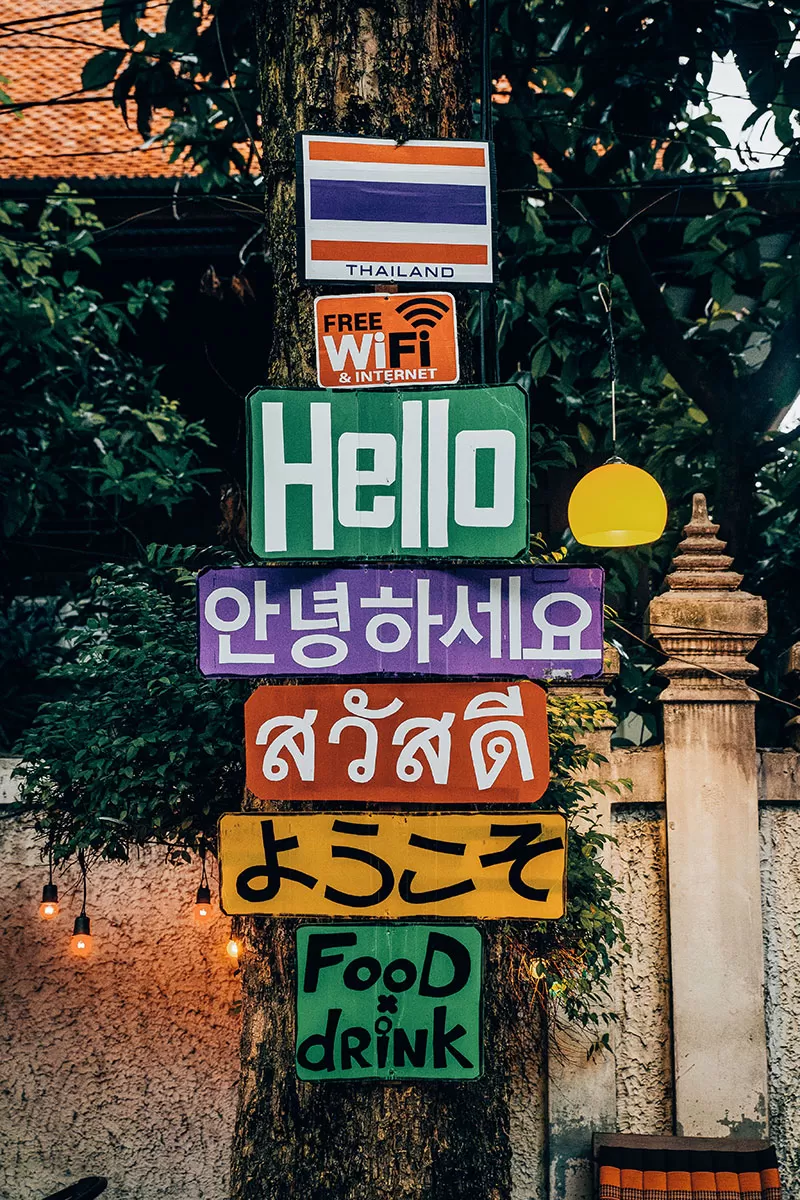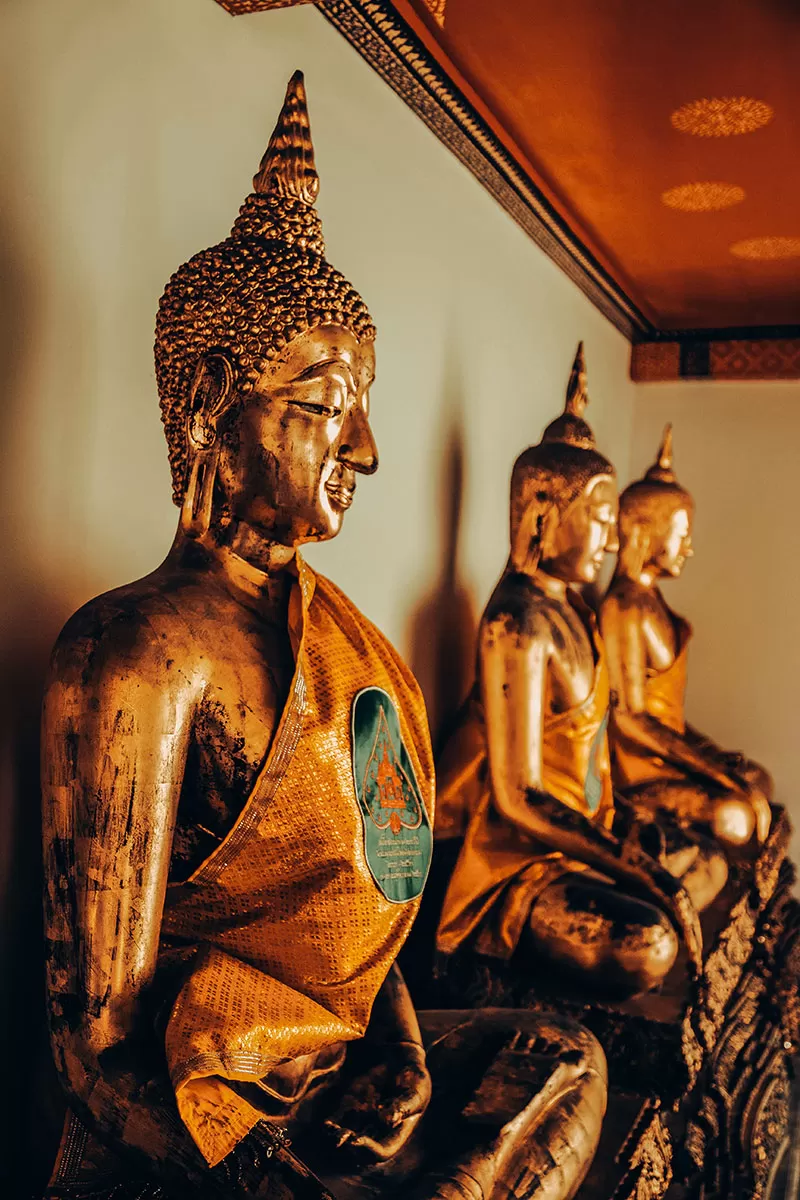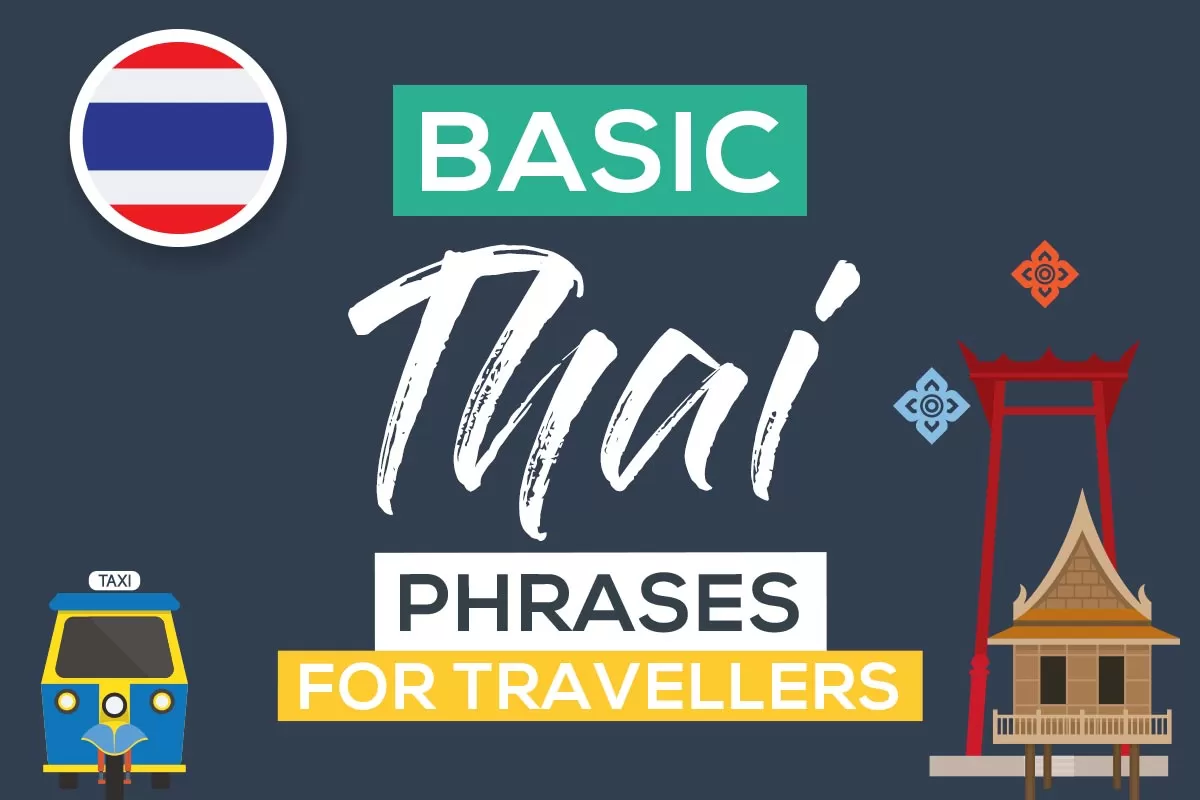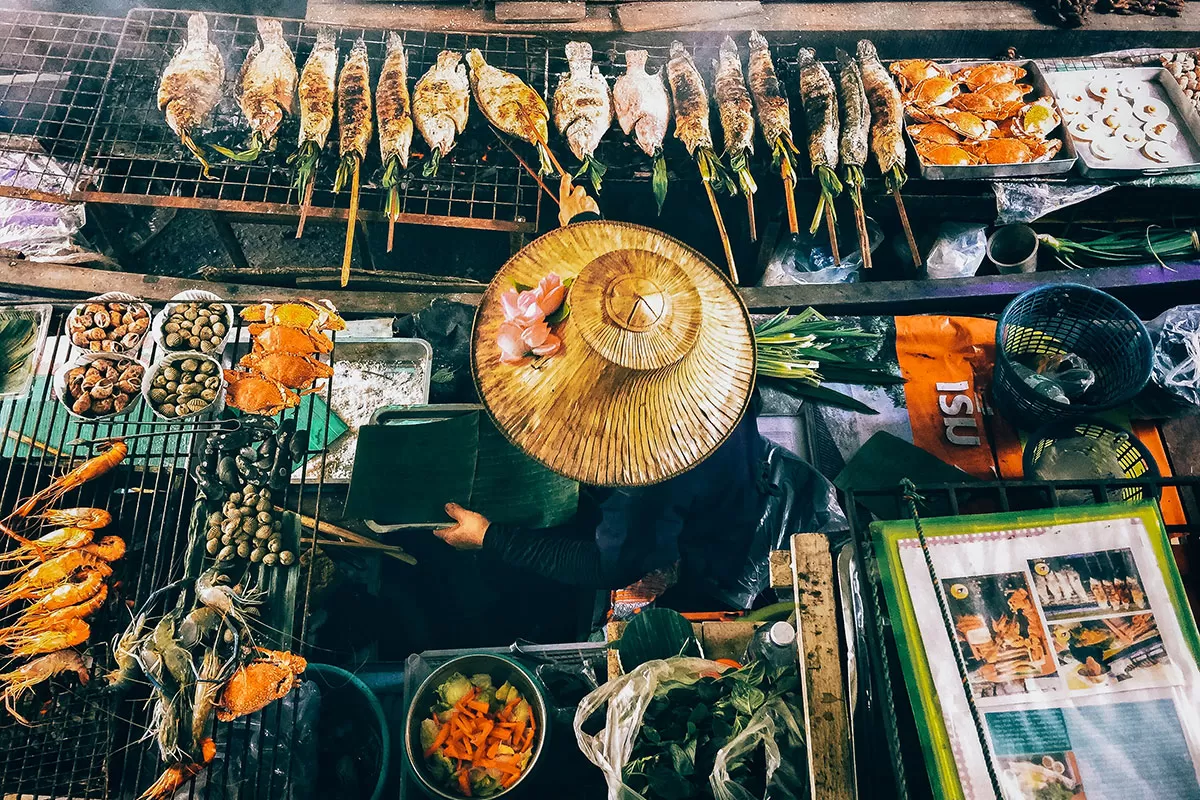Whatever the reason for your visit to the Land of Smiles, you should come prepared with at least some knowledge of the Thai language. Use this comprehensive phrase guide to learn the most essential Thai phrases for travel and you’re guaranteed to win over the locals.
Thailand is one of the most visited countries in the world, and it is easy to see why. The landscape is incredibly diverse, the beaches are legendary and the food is fantastic. The tropical weather makes for a great getaway from the colder climates of Europe, the US and further afield. Thai culture is also unique, shaped by its long history.
Just like all my other travel phrase cheat-sheets, this Thai language guide includes practical phrases and vocabulary which will help you better understand its speakers and have more meaningful conversations and interactions with the locals. To help me create this guide, I asked Ling App to provide the translations and insights into Thai cultural to make the learning process easier.
Before we dive into the which Thai phrases you should learn, let’s delve deeper into the beautiful Thai language, learn about its interesting origins and where it is used.
Let’s take a closer look at the Thai language. Here’s what we’ll cover:
Table of Contents
- A Quick History of Thai
- Where is Thai spoken?
- How many people speak Thai?
- Thai Alphabet
- Thai Grammar
- Thai Pronunciation
- Thai Culture
- 208 Basic Thai Phrases for Travel
- 208 Basic Thai Phrases for Travel [Infographic]
A Quick History of Thai
 The Thai language is part of the Southwestern language family, which it shares with many languages in the Southeast Asian peninsula such as Lao and Shan. In terms of vocabulary, many words in the Thai language derive from Pali and Sanskrit, two historical Indic languages. Likewise, Thai has also borrowed heavily from Mon (an indigenous language of Thailand and Myanmar) and Khmer (the official language of Cambodia).
The Thai language is part of the Southwestern language family, which it shares with many languages in the Southeast Asian peninsula such as Lao and Shan. In terms of vocabulary, many words in the Thai language derive from Pali and Sanskrit, two historical Indic languages. Likewise, Thai has also borrowed heavily from Mon (an indigenous language of Thailand and Myanmar) and Khmer (the official language of Cambodia).
Modern Thai has been shaped across several eras, starting with Old Thai. Over time, the language morphed due to numerous influences, population changes and territorial changes. The first Thai script appeared during the thirteenth century, and would also see significant changes as it evolved into the Thai script used today.
Where is Thai Spoken?
 Now that we know the history, we can have a look at where Thai is actually spoken. As you would imagine, Thai is the official language of Thailand. While that may be obvious, there is plenty of diversity even within the Thai language. For example, there are many different dialects of Thai.
Now that we know the history, we can have a look at where Thai is actually spoken. As you would imagine, Thai is the official language of Thailand. While that may be obvious, there is plenty of diversity even within the Thai language. For example, there are many different dialects of Thai.
The most common dialect would be Central Thai, spoken natively in Bangkok, the country’s capital and in the central region. There are also distinct dialects to the south, east and north of Thailand. The most notable of which are the Southern dialect and the Isaan (Northeastern) dialect of Thai, which shares many similarities with the language of neighbouring Laos.
Speaking of Laos, many people, especially those in the Northeastern region of Thai, are able to speak or at least understand the language due to their similarities. A lot of the media in Laos comes from Thai, so it is understood by a good portion of the population. Many people from Laos also come to work in Thailand, making it quite common as you get closer to the border.
The same is true for Khmer, Malay and Burmese. Thai is also a recognised language in some areas of its neighbouring countries. Not to mention that there are numerous minority languages spoken around Thailand by the minority groups too.
Ultimately, almost everyone in Thailand speaks Thai. It may be spoken in other countries where Thai people have moved to work, but it isn’t spoken officially anywhere else.
 How Many People Speak Thai?
How Many People Speak Thai?
The total number of Thai speakers is estimated to be around 60 million, placing it 22nd in the list of most spoken languages in the world. This includes both native speakers and second language speakers.
Thai Alphabet
The Thai language has its own alphabet. It is made up of 44 consonants and 28 vowels. Below is a chart that shows the consonants written with acrophonics, which means they are written together with words that start with that consonant’s sound. This is the typical way the Thai alphabet is presented.
Note: Some consonants and vowels in the Thai alphabet are obsolete, such as ฃ= k kɔ̌ɔ-kùuat bottle and ฅ= k kɔɔ-kon person. So, Thai people don’t use them anymore in their new writing. However, Thai learners might see these obsolete characters somewhere in Thailand such as an old store board or old books. The reason is because these writings haven’t been updated.
Thai Letter | Example Thai word | Thai Pronunciation | English Meaning |
| ก | ก ไก่ | g gɔɔ-gài | chicken |
| ข | ข ไข่ | k kɔ̌ɔ-kài | egg |
| ฃ | ฃ ขวด | k kɔ̌ɔ-kùuat | bottle (no longer in use) |
| ค | ค ควาย | k kɔɔ–kwaai | buffalo |
| ฅ | ฅ คน | k kɔɔ-kon | person (no longer in use) |
| ฆ | ฆ ระฆัง | k kɔɔ-rá-kang | bell |
| ง | ง งู | ng ngɔɔ-nguu | snake |
| จ | จ จาน | j jɔɔ-jaan | plate |
| ฉ | ฉ ฉิ่ง | ch chɔ̌ɔ-chìng | cymbals |
| ช | ช ช้าง | ch chɔɔ-cháang | elephant |
| ซ | ซ โซ่ | s sɔɔ-sôo | chain |
| ฌ | ฌ เฌอ | ch chɔɔ-chəə | tree |
| ญ | ญ หญิง | y yɔɔ-yǐng | woman |
| ฎ | ฎ ชฎา | d dɔɔ-chá-daa | headdress |
| ฏ | ฏ ปฏัก | dt dtɔɔ-bpà-dtàk | goad |
| ฐ | ฐ ฐาน | t tɔ̌ɔ-tǎan | pedestal |
| ฑ | ฑ มณโฑ | t tɔɔ-mon-too | Montho |
| ฒ | ฒ ผู้เฒ่า | t tɔɔ-pûu-tâo | elder |
| ณ | ณ เณร | n nɔɔ-neen | novice monk |
| ด | ด เด็ก | d dɔɔ-dèk | child |
| ต | ต เต่า | dt dtɔɔ-dtào | turtle |
| ถ | ถ ถุง | t tɔ̌ɔ-tǔng | sack |
| ท | ท ทหาร | t tɔɔ-tá-hǎan | soldier |
| ธ | ธ ธง | t tɔɔ-tong | flag |
| น | น หนู | n nɔɔ-nǔu | mouse |
| บ | บ ใบไม้ | b bɔɔ-bai-mái | leaf |
| ป | ป ปลา | bp bpɔɔ-bplaa | fish |
| ผ | ผ ผึ้ง | p pɔ̌ɔ–pʉ̂ng | bee |
| ฝ | ฝ ฝา | f fɔ̌ɔ-fǎa | lid |
| พ | พ พาน | p pɔɔ-paan | tray |
| ฟ | ฟ ฟัน | f fɔɔ-fan | teeth |
| ภ | ภ สำเภา | p pɔɔ-sǎm-pao | junk boat |
| ม | ม ม้า | m mɔɔ-máa | horse |
| ย | ย ยักษ์ | y yɔɔ-yák | giant |
| ร | ร เรือ | r rɔɔ-rʉʉa | boat |
| ล | ล ลิง | l lɔɔ-ling | monkey |
| ว | ว แหวน | w wɔɔ-wɛ̌ɛn | ring |
| ศ | ศ ศาลา | s sɔ̌ɔ-sǎa-laa | pavilion |
| ษ | ษ ฤๅษี | s sɔ̌ɔ-rʉʉ-sǐi | hermit |
| ส | ส เสือ | s sɔ̌ɔ-sʉ̌ʉa | tiger |
| ห | ห หีบ | h hɔ̌ɔ-hìip | chest |
| ฬ | ฬ จุฬา | l lɔɔ-jù-laa | kite |
| อ | อ อ่าง | o ɔɔ-àang | basin |
| ฮ | ฮ นกฮูก | h hɔɔ-nók-hûuk | owl |
 The Thai Vowels
The Thai Vowels
The vowels can be categorised into short and long vowels, which can be identified by the character used. Essentially, it dictates whether you say the syllable for a longer or shorter period of time.
Thai Short Vowels
Thai Vowel | Thai Vowel Name | Pronunciation |
| อะ | sara a | a |
| อิ | sara i | ih |
| อึ | sara ue | ue |
| อุ | sara u | u |
| เอะ | sara e | eh |
| แอะ | sara ae | ae |
| โอะ | sara o | o |
| เอาะ | sara o | aw |
| เออะ | sara oe | oe |
| เอียะ | sara ia | ia |
| เอือะ | sara uea | uea |
| อัวะ | sara ua | ua |
| อำ | sara am | am |
| ไอ | sara ai | ai |
| ใอ | sara ai | ai |
| เอา | sara ao | ow |
Thai Long Vowels
Thai Vowel | Thai Vowel Name | Pronunciation |
| อา | sara a | aah |
| อี | sara i | ee |
| อื | sara ue | uue |
| อู | sara u | oo |
| เอ | sara e | ay |
| แอ | sara ae | aeeh |
| โอ | sara o | ooh |
| ออ | sara o | aww |
| เออ | sara oe | uuh |
| เอีย | sara ia | iaa |
| เอือ | sara uea | uea |
| อัว | sara ua | uah |
Thai Grammar
 The basic word order of Thai is SVO – that is to say, the Subject comes first in the sentence, followed by the Verb and then the Object. This is a good guide for building basic sentences, but it doesn’t tell the whole story.
The basic word order of Thai is SVO – that is to say, the Subject comes first in the sentence, followed by the Verb and then the Object. This is a good guide for building basic sentences, but it doesn’t tell the whole story.
The omission of the subject is not uncommon in Thai. If the subject is obvious from the context, then the pronouns can be left out. The object can also be left out in some cases. This can make things rather ambiguous, which again makes the context important.
Other ways that Thai word order differs from English include the fact that, for questions, the question particles are added to the end of the sentence. Adjectives come after the verb, too. As for nouns, when they are pluralised, a classifier needs to be used. Classifiers are also used in English for some words, but in Thai, they are much more prevalent.
Thai Pronunciation
Just like Norwegian, Swedish and Vietnamese, Thai is a tonal language on top of which, it also has its own unique alphabet. This combination can make it quite difficult to learn Thai for English speakers, where tones are a foreign concept. There are five tones in total: Low, Mid, High, Falling and Rising. These will impact the pitch you use when pronouncing the word. You will know which tone to use based on the tone markers of the written word.
There are some sounds in the Thai language that are not seen in the English language. In Thai, they differentiate between aspirated and unaspirated consonants. This means that some consonants are said with a puff of air while others are not. Then there are some combinations that are different: the ‘bp’ sound is unique to Thai.
While the Thai consonants all have at least some resemblance or equivalents in English, Thai vowels are a bit more complicated. As well as the aforementioned vowel length distinctions, there are some sounds that are just not present in the English language. It is a case of learning and practising their pronunciation.
Thai Culture
 Thai culture has been heavily influenced by Buddhism, the predominant religion of the country. Temples, monks and ceremonies are common sights across Thailand. It has also shaped society in a number of different ways. For example, there are different ways of speaking when it comes to religion and religious texts. You will see many people wearing amulets (a kind of good luck charm believed to protect its possessor) too, or even tattoos that are said to have magical powers.
Thai culture has been heavily influenced by Buddhism, the predominant religion of the country. Temples, monks and ceremonies are common sights across Thailand. It has also shaped society in a number of different ways. For example, there are different ways of speaking when it comes to religion and religious texts. You will see many people wearing amulets (a kind of good luck charm believed to protect its possessor) too, or even tattoos that are said to have magical powers.
Family and status are held in high regard in Thai culture. When it comes to the age and position of a person (i.e. your boss), you would speak differently compared to if you were talking with someone equal to you. For families, it is not unusual for them to be close. Many children send money back to their parents every month to support them. If they don’t need to move away for work, then they likely live with or very close to their extended families too.
Another feature of Thai culture is the slower, less stressful outlook on life. Whether due to the heat or the relaxing atmosphere, people will avoid any strong emotions or reactions, instead having a calm demeanour. This is a way of saving face, or avoiding others looking down on them. They may not make it seem like a big deal, but you should know their outward appearance in public may not reflect what they feel inside.
208 Basic Thai Phrases For Travel

Want the infographic to take with you? Scroll to the bottom of the page and save it or pin it for later!.
Common Greetings
| English Translation | Thai Translation | Pronunciation |
| Hello | สวัสดี | sà-wàt-dii |
| Good morning | สวัสดี ตอนเช้า | sà-wàt-dii dtɔɔn-cháo |
| Good afternoon | สวัสดี ตอนบ่าย | sà-wàt-dii dtɔɔn-bàai |
| Good evening | สวัสดี ตอนเย็น | sà-wàt-dii dtɔɔn-yen |
| Good night | ราตรีสวัสดิ์ | raa-dtrii-sà-wàt |
| Goodbye | ลาก่อน | laa-gɔ̀ɔn |
| See you later | แล้วเจอกัน | lɛ́ɛo-jəə-gan |
| Until next time | เจอกันใหม่ | jəə-gan-mài |
| How are you? | สบายดี ไหม | sà-baai-dii mǎi |
| Good | สบายดี | sà-baai-dii |
| So-so | เรื่อย ๆ | rʉ̂ʉai rʉ̂ʉai |
| Not bad | ไม่เลว | mâi leo |
| I’m not well | ไม่ สบาย | mâi sà-baai |
| Good, thank you, and you? | ฉัน ดี. สบายดี ไหม | chǎn dii. sà-baai-dii mǎi |
| What is your name? | คุณ ชื่อ อะไร | kun chʉ̂ʉ à-rai |
| My name is… | ฉัน ชื่อ | chǎn chʉ̂ʉ |
| Where are you from? | คุณ มา จาก ที่ไหน | kun maa jàak tîi-nǎi |
| I’m from [Insert name of city] | ฉัน มา จาก | chǎn maa jàak |
| I’m from [Insert name of country] | ฉัน มา จาก ประเทศ | chǎn maa jàak bprà-tét |
| I’m….American, English, Australian, Canadian | ฉัน คน สหรัฐอเมริกา, คน อังกฤษ, คน ออสเตรเลีย, คน แคนาดา | chǎn kon sà-hà-rát-à-me-rí-gaa, kon ang-gr̀ìt, kon ɔ́ɔt-sà-dtree-riia, kon kɛɛ-naa-daa |
| It’s nice to meet you | ยินดี ที่ ได้ รู้จัก | yin-dii tîi dâi rûu-jàk |
How to be Polite
| English Translation | Thai Translation | Pronunciation |
| Please | กรุณา | gà-rú-naa |
| Thank you | ขอบคุณ | kɔ̀ɔp-kun |
| Thank you very much | ขอบคุณ มาก | kɔ̀ɔp-kun mâk |
| You’re welcome | ยินดี | yin-dii |
| Yes | ใช่ | châi |
| No | ไม่ใช่ | mâi-châi |
| That’s fine / ok | โอเค | oo-ke |
| Excuse me (to get attention) | ขอโทษ | kɔ̌ɔ-tôot |
| Excuse me (to get past someone) | ขอโทษ | kɔ̌ɔ-tôot |
| I’m sorry | ขอโทษ | kɔ̌ɔ-tôot |
| I don’t understand | ไม่ เข้าใจ | mâi kâo-jai |
| Do you speak English? | คุณ พูด ภาษา อังกฤษ ได้ไหม | kun pûut paa-sǎa ang-grìt dâi-mǎi |
| I don’t speak Thai | พูด ภาษา ไทย ไม่ได้ | pûut paa-sǎa tai mǎi-dâi |
| I only speak a little bit of Thai | พูด ภาษา ไทย ไม่ นิดน้อย | pûut paa-sǎa tai dâi nít-noi |
| Can you please repeat that slowly? | คุณ พูด ชัดเจน กว่านี้ ได้ไหม | kun pûut chát-jeen gwàa-níi dâi-mǎi |
| Maybe | อาจจะ | àat-jà |
| I don’t know | ไม่ รู้ | mâi rûu |
| I don’t think so | ฉันไม่ คิด อย่างงั้น | chǎn mâi kít yàang-ngán |
| Certainly! Of course! | แน่นอน | nɛ̂ɛ-nɔɔn |
Questions
| English Translation | Thai Translation | Pronunciation |
| Where is …? | …อยู่ ที่ไหน | …yùu tîi-nǎi |
| Where are…? | …อยู่ ที่ไหน | …yùu tîi-nǎi |
| Where? | ที่ไหน | tîi-nǎi |
| How? | อย่างไร | yàang-rai |
| How much? | เท่าไหร่ | tâo-rài |
| Who? | ใคร | krai |
| When? | เมื่อไหร่ | mʉ̀ʉa-rài |
| Why? | ทำไม | tam-mai |
| What? | อะไร | à-rai |
| Which? | อันไหน | an-nǎi |
| How much does this cost? | อันนี้ เท่าไหร่ | an-níi tâo-rài |
| How much does that cost? | อัน นั้น เท่าไหร่ | an-nán tâo-rài |
| Where is the toilet? | ห้องน้ำ อยู่ ที่ไหน | hɔ̂ɔng-nám yùu tîi-nǎi |
| Can I have…? | ฉัน ขอ…ได้ไหม | chǎn kɔ̌ɔ…dâi-mǎi |
| I would like… | ฉัน อยาก | chǎn yàak |
Eating out & Ordering Food
| English Translation | Thai Translation | Pronunciation |
| Where is a good restaurant? | คุณ ช่วย แนะนำ ร้านอาหาร ดี ได้ไหม | kun chûuai nɛ́ɛ-nam ráan-aa-hǎan dii dâi-mǎi |
| What would you like to order? | คุณ อยาก สั่ง อะไร คะ | kun yàak sàng à-rai ká |
| How many are you? | มี กี่คน | mii gìi-kon |
| Appetizer | ของกินเล่น | kɔ̌ɔng gin lên |
| First course | จานแรก | jaan-rɛ̂ɛk |
| Second course | จานหลัก | jaan-làk |
| Side dish | เครื่องเคียง | krʉ̂ʉang kiiang |
| Salad | ผักสลัด | pàk-sà-làt |
| Dessert | ของหวาน | kɔ̌ɔng-wǎan |
| Drinks? | คุณ อยาก ดื่ม ไหม | kun yàak dʉ̀ʉm mǎi |
| Another one, please. | อีก หนึ่ง | ìik nʉ̀ng |
| I would like… | ฉัน ขอ สั่ง… | chǎn kɔ̌ɔ sàng… |
| The menu, please | ขอ เมนู | kɔ̌ɔ mee-nuu |
| Two beers, please | ขอ เบียร์ สอง ขวด | kɔ̌ɔ biia sɔ̌ɔng kùat |
| A bottle of wine, please | ขอ ไวน์ หนึ่ง ขวด | kɔ̌ɔ waai nʉ̀ng kùat |
| Red wine | ไวน์แดง | waai-dɛɛng |
| White wine | ไวน์ขาว | waai-kăao |
| A bottle of still water | ขอ น้ำ หนึ่ง ขวด | kɔ̌ɔ nám nʉ̀ng kùat |
| A bottle of sparkling water | ขอ น้ำโซดา หนึ่ง ขวด | kɔ̌ɔ nám-soda nʉ̀ng kùat |
| What do you recommend? | มี อาหาร แนะนำ ไหม | mii aa-hǎan nɛ́-nam mǎi |
| Is the sauce spicy? | มัน ไม่ เผ็ด เกินไป ใช่ ไหม คะ | man mâi pèt gəən-bpai châi mái ká |
| I’m allergic to… | ฉัน แพ้ | chǎn pɛ́ɛ |
| I’m a vegetarian | ฉัน ไม่ กิน เนื้อสัตว์ | chǎn mâi gin nʉ́ʉa-sàt |
| The bill, please | เก็บ เงิน ด้วย | gèp ngəən dûuai |
| Enjoy your food! | ทาน ให้ อร่อย | taan hâi à-ròi |
| It was delicious! | อร่อย มาก | à-ròi mâak |
Getting Around
| English Translation | Thai Translation | Pronunciation |
| I’m lost | ฉัน หลงทาง | chǎn lǎng-tang |
| I would like to go to… | ฉัน อยาก ไป | chǎn yàak bpai |
| How do I get to… | ชั้น ไป…อย่างไร | chǎn bpai…yàang-rai |
| Where is …? | …อยู่ ที่ไหน | …yùu tîi-nǎi |
| the hotel | โรงแรม | roong-rɛɛm |
| the bathroom | ห้องน้ำ | hɔ̂ɔng-nám |
| the (train) station | สถานีรถไฟ | sà-tǎa-nii-rót-fai |
| the shops | ศูนย์การค้า | sǔun-gaan-káa |
| the restaurant | ร้านอาหาร | ráan-aa-hǎan |
| the museum | พิพิธภัณฑ์ | pí-pít-tá-pan |
| the post office | ไปรษณีย์ | bprai-sà-nii |
| the market | ตลาด | dtà-lǎat |
| the pharmacy | ร้านขายยา | ráan-kǎi-yaa |
| the hospital | โรงพยาบาล | roong-pá-yaa-baan |
| the bus stop | ป้ายรถบัส | bpâi-rót-bát |
| the airport | สนามบิน | sà-nǎam-bin |
| the tourist center | ศูนย์ให้บริการนักท่องเที่ยว | sǔun-hâi-bɔɔ-rí-gaan-nák-tɔ̂ɔng-tîiao |
| the theatre | โรงละคร | roong lá-kɔɔn |
| the park | สวน | sǔuan |
| the city/town centre | ใจกลางเมือง | jai-glaang mʉʉang |
| Entrance | ทางเข้า | taang-kâo |
| Exit | ทางออก | taang-ɔ̀ɔk |
| the timetable | ตารางเวลา | dtaa-raang-wee-laa |
| departure | การออก | gaan-ɔ̀ɔk |
| When does it arrive there? | จะ ถึง ที่นั่น เวลา เท่าไหร่ | jà tʉ̌ng tîi-nân wee-laa tâo-rài |
| How long does it take to get there? | ใช้ เวลา เดิน นานแค่ไหน | chái we-laa dəən naan-kɛ̂ɛ-nǎi |
| How much is the fare? | ตั๋ว ราคา เท่าไหร่ | dtǔua raa-kaa tâo-rài |
| the train | รถไฟ | rót-fai |
| the flight | เที่ยวบิน | tîiao-bin |
| the baggage | กระเป๋า | grà-bpǎo |
| I need a taxi | ฉัน ต้องการ แท็กซี่ | chǎn dtɔ̂ɔng-gaan tɛ́ɛk-sîi |
| Please stop here (to a taxi driver) | จอด ที่นี่ | jɔ̀ɔt tîi-nîi |
Directions
| English Translation | Thai Translation | Pronunciation |
| Turn… | เลี้ยว | líiao |
| Left | ซ้าย | sáai |
| Right | ขวา | kwǎa |
| Straight ahead | ตรงไป | dtrong-bpai |
| Towards… | ไปทาง | bpai taang |
| It’s close by | ใกล้ | glâi |
| Across from | ตรงข้ามกับ | dtrong-kâam-gàp |
| Behind | ด้านหลัง | dâan-lǎng |
| Under | ใต้ | dtâi |
| Before | ก่อน | gɔ̀ɔn |
| Past | ผ่าน | pàan |
Sightseeing
| English Translation | Thai Translation | Pronunciation |
| I would like… | ฉัน อยาก ซื้อ… | chǎn yàak sʉ́ʉ |
| a ticket | ตั๋ว | dtǔua |
| two tickets | ตั๋วสองใบ | dtǔua-sɔ̌ɔng-bai |
| two adults | ผู้ใหญ่ สอง คน | pûu-yài sɔ̌ɔng kon |
| one child | เด็ก หนึ่ง คน | dèk nʉ̀ng kon |
| one student | นักเรียน หนึ่ง คน | nák-riian nʉ̀ng kon |
| one senior | ผู้รับเงินบำนาญ คน | pûu-ráp-ngəən-bam-naan kon |
Numbers
| English Translation | Thai Translation | Pronunciation |
| 0 | ศูนย์ | sǔun |
| 1 | หนึ่ง | nʉ̀ng |
| 2 | สอง | sɔ̌ɔng |
| 3 | สาม | sǎam |
| 4 | สี่ | sìi |
| 5 | ห้า | hâa |
| 6 | หก | hòk |
| 7 | เจ็ด | jèt |
| 8 | แปด | bpɛ̀ɛt |
| 9 | เก้า | gâo |
| 10 | สิบ | sìp |
| 11 | สิบเอ็ด | sìp-èt |
| 12 | สิบสอง | sìp-sɔ̌ɔng |
| 13 | สิบสาม | sìp-sǎam |
| 14 | สิบสี่ | sìp-sìi |
| 15 | สิบห้า | sìp-hâa |
| 16 | สิบหก | sìp-hòk |
| 17 | สิบเจ็ด | sìp-jèt |
| 18 | สิบแปด | sìp-bpɛ̀ɛt |
| 19 | สิบเก้า | sìp-gâo |
| 20 | ยี่สิบ | yì-sìp |
| 30 | สามสิบ | sǎam-sìp |
| 40 | สี่สิบ | sìi-sìp |
| 50 | ห้าสิบ | hâa-sìp |
| 60 | หกสิบ | hòk-sìp |
| 70 | เจ็ดสิบ | jèt-sìp |
| 80 | แปดสิบ | bpɛ̀ɛt-sìp |
| 90 | เก้าสิบ | gâo-sìp |
| 100 | หนึ่ง ร้อย | nʉ̀ng rói |
| 1000 | หนึ่ง พัน | nʉ̀ng pan |
 Telling the time
Telling the time
| English Translation | Thai Translation | Pronunciation |
| Today | วันนี้ | wan-níi |
| Tomorrow | พรุ่งนี้ | prûng-níi |
| The day after tomorrow | วันมะรืนนี้ | wan-márun-níi |
| Yesterday | เมื่อวาน | mʉ̂ʉa-waan |
| Soon | เร็ว | reo |
| Later | ต่อมา | dtɔ̀ɔ-maa |
| Excuse me, what time is it? | กี่โมง แล้ว | gìi-moong lɛ́ɛo |
| When does it open? | เปิด กี่โมง | bpə̀əd gìi-moong |
| When does it close? | ปิด กี่โมง | bpìd gìi-moong |
| in the morning | เช้า | cháo |
| in the afternoon | บ่าย | baaì |
| It’s 1 o’clock | ตีหนึ่ง | dtii-nʉ̀ng |
| It’s 6 o’clock | หกโมงเช้า | hòk-moong-cháo |
| It’s half past 8 | แปดโมงครึ่ง | bpɛ̀ɛt-moong-krʉ̂ng |
| a minute | นาที | naa-tii |
| an hour | ชั่วโมง | chûua-moong |
Days of the Week
| English Translation | Thai Translation | Pronunciation |
| Monday | วันจันทร์ | wan-jan |
| Tuesday | วันอังคาร | wan-ang-kaan |
| Wednesday | วันพุธ | wan-pút |
| Thursday | วันพฤหัสบดี | wan-pá-rʉ́-hàt-sà-bɔɔ-dii |
| Friday | วันศุกร์ | wan-sùk |
| Saturday | วันเสาร์ | wan-sǎao |
| Sunday | วันอาทิตย์ | wan-aa-tít |
Emergencies
| English Translation | Thai Translation | Pronunciation |
| Help! | ช่วยด้วย | chûuai-dûuai |
| I need a doctor | อยาก พบ คุณหมอ | yàak póp kun-mɔ̌ɔ |
| I feel ill | ฉัน ป่วย | chǎn bpùuai |
| I have pain here | ฉัน ปวด | chǎn bpùat |
| Call… | โปรด เรียก | bpròot rîiak |
| the police | ตำรวจ | dtam-rùat |
| an ambulance | รถพยาบาล | rót-pá-yaa-baan |
| the fire brigade | รถดับเพลิง | rót-dàp-pləəng |
| There’s a fire | ไฟไหม้ | fai-mâi |
| Watch out! | ระวัง | rá-wang |
| Stop, thief! | โจร | joon |
| Go away! | ไป ให้ พ้น | bpai hâi pòn |
| There’s been an accident | ฉัน ได้รับ อุบัติเหตุ | chǎn dâi-ráp ù-bàt-dtì-hèt |
| Damage | เสียหาย | sǐia-hǎai |
| Pain | ปวด | bpùuat |
| I’ve been assaulted / I’ve been attacked | มีคน ตี ฉัน | mii kon dtii chǎn |
| I lost my passport | ฉัน ทำ พาสปอร์ต หาย | chǎn tam páat-sà-bpɔ̀ɔd hǎai |
| Where is the American/British/Australian/Canadian embassy? | สถานทูต สหรัฐอเมริกา/อังกฤษ/ออสเตรเลีย/แคนาดา อยู่ ที่ไหน | sà-tǎan-tûut sà-hà-rát-à-me-rí-gaa / ang-gr̀ìt / ɔ́ɔt-sà-dtree-riia / kɛɛ-naa-daa yùu tîi-nǎi |
| Police station | สถานีตำรวจ | sà-tǎa-nii-dtam-rùat |
 Shopping
Shopping
| English Translation | Thai Translation | Pronunciation |
| Are you looking for something? | คุณ กำลัง หา อะไร คะ | kun gam-lang hǎa à-rai ká |
| Can I help you? | มี อะไร ให้ ช่วย ไหม คะ | mii à-rai hâi chûuai mái ká |
| What are you looking for? | คุณ กำลัง หา อะไร คะ | kun gam-lang hǎa à-rai ká |
| May I just look? | ดูก่อน ได้ไหม | duu-gɔ̀ɔn dâi-mǎi |
| That’s too expensive! | แพง มาก เลย | pɛɛng mâak ləəi |
| Can you give me a discount? | ลด ราคา ได้ไหม | lót raa-kaa dâi-mǎi |
| I’ll buy it! | ฉัน อยาก ซื้อ | chǎn yàak sʉ́ʉ |
| Anything else? | มี อะไร ให้ ช่วย อีก ไหม คะ | mii â-rai hâi chûuai ìik mái ká |
| Nothing else, thank you. | ไม่มี ครับ แค่นี้ ครับ | mâi-mii kráp kɛ̂ɛ-níi kráp |
| May I pay with credit card? | จ่าย ด้วย บัตรเครดิต ได้ไหม | jài dûuai bàt-kree-dìt dâi-mǎi |
| May I pay with cash? | จ่าย ด้วย เงินสด ได้ไหม | jài dûuai ngəən-sòt dâi-mǎi |
Want to have fun whilst learning Thai? Struggling to find decent Thai language resources? I recommend getting uTalk. Available as a desktop site and app, uTalk is awesome for learning key words and phrases in Thai, especially if you want to use it for travel purposes. It’s great for beginners getting started in a language and invaluable for intermediates looking to fill in gaps in their vocabulary and pronunciation.
What I love most about uTalk is that you can jump around their extensive library of topics and choose what you want to learn, when you want, and at your own pace. Because I believe in uTalk so much, I reached out to them and we’ve teamed up to offer you an exclusive 30% OFF reader discount across all of uTalk’s 140 languages! This offer isn’t available anywhere else! Click here to claim your exclusive 30% discount.
Basic Thai Phrases Essential for Travel [Infographic]

Like it? Pin it for later!

Sources / A big thanks to Ling-App for the translations
Want to know more about learning languages? Start here!
- 44 Best Movies on Disney Plus for Learning Languages
- What Type of Language Learner Are You? Your 4-Step Personalised Learning Plan
- 13 Ways to Seamlessly Integrate Language Learning into Your Daily Life
- 15 Top Language Learning Resources You Should Use in 2020
- 7 Reasons Why You Should Go on a Language Holiday
- 10 Pro Tips: How to Learn a Language with a Full-Time Job
- Essential Travel Phrases: How to be Travel Fluent in 10 Simple Steps
- How to Learn Your First Foreign Language in 8 Simple Steps: A Beginner’s Guide
- 11 Life-Changing Reasons Why You Should Learn a Language
- 23 Cool Gift for Language Learners They Will Actually Use and Love
- 42 beautiful Inspirational Quotes for Language Learners
- Language learning tips: 11 Polyglots Reveal The Secrets of Their Success
- Top 10 Best Ways to Learn a Language Better and Faster
- How to Learn Italian Before Your Trip
- Language Learning Tips for Anyone Who’s Ever Doubted Themselves
- Free Travel Phrase Guides
- How a ‘Potato’ improved my French Pronunciation
- How Many Languages are there in the world?
- Mondly Review: 10 Ways Mondly Drastically Improved My Language Learning
- 78 FREE Dictionaries to Learn a Language Fast [Free eBook Download]
- 22 KEY Travel Phrases That Will Transform Your Travels [Free Guide]
Over to you!
Which of these Thai phrases did you find the most useful? Let me know in the comments section below or join me on social media to start a conversation.
Thanks for reading and I hope you enjoyed this post.
Like what you see? Subscribe using the form below to have all of my posts delivered directly to your email.





